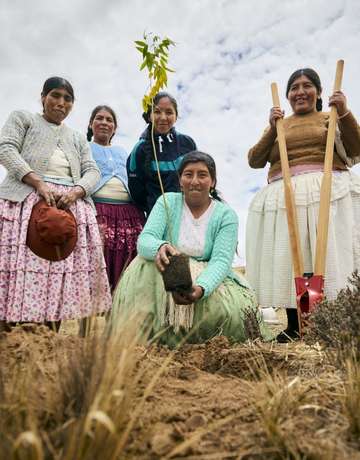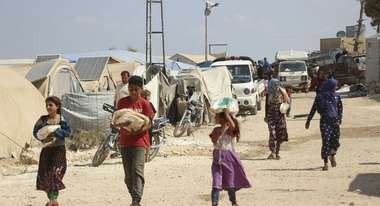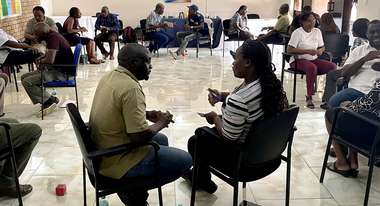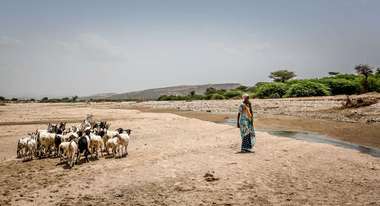„Food Security is not a Divisive but Rather a Unifying Subject"
In Bolivia, Maria-Teresa Nogales, director of the Fundacion Alternativas, has observed important advances in the Right to Food - but still sees a long way ahead.
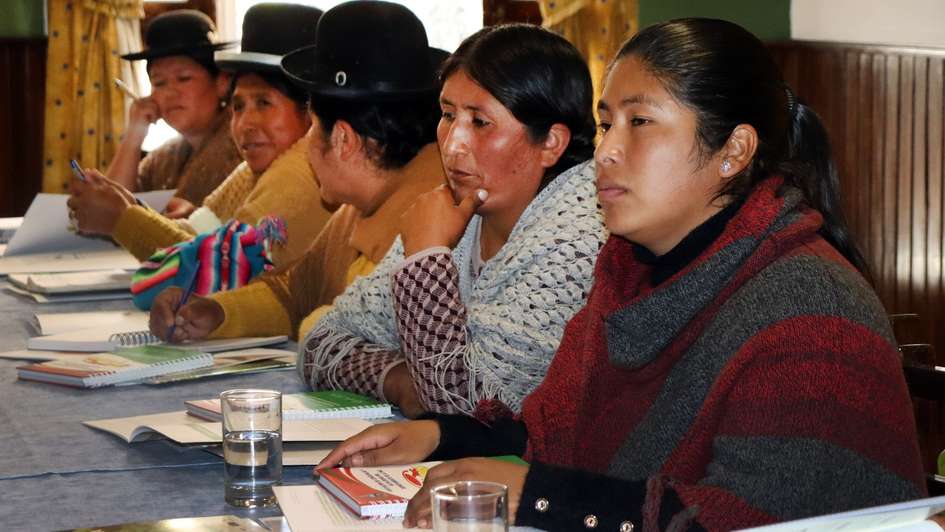
Global Food Journal: Ms Nogales, How would you describe the state of the Right to Food in Bolivia?
Maria-Teresa Nogales: Bolivia was one of the first countries that recognized the Right to Food in its constitution, in 2009. As a result, we now have a very robust legal framework, especially at the national level. In this regard, Bolivia has done its homework.
Zur Person
Maria-Teresa Nogales is director of Fundacion Alternativas, an organisation that does advocacy work among decision makers to make food systems more resilient and sustainable in the metropolitan area of La Paz comprising two million inhabitants. It started with a Round Table for politicians, nutritional scientists, architects and consumers; in cooperation with Welthungerhilfe the concept of Multi Actor Platforms was born, comprising additional actors from civil society, business, government and academia.
However, if you compare the legal rights situation with what's happening on the ground, you realize that we are clearly far away from achieving the Right to Food. Just look at the national data: Approximately 20% of the population still lives with hunger and inversely approximately 43% of the population is already either overweight or obese. In other words: More than 60% of the population is not eating in a way that is conducive to food security or a healthy and sustainable life. There is still a long way to go to achieve the Right to Food.
What are the key elements of your Right to Food work and projects?
We promote food policy work and urban agriculture. Together with diverse food system actors we develop policy recommendations to ensure that all people can have access to healthy and nutritious food.
In the case of the metropolitan region of La Paz: It is made up of eight municipalities, six of which are still primarily rural. Interestingly, many farmers find it very difficult to integrate into the metropolitan market; therefore we are working with them to improve their farming practices, to produce better and more and to access urban market opportunities.
We also noticed that there is a huge disconnect between consumers and farmers. Many people don’t know where their food comes from and how it is produced. Too often, they take food for granted. Thus, we also work to promote agrotourism as a means of educating consumers on the importance of supporting local farmers. In addition, ten years ago, we transformed an abandoned park in La Paz into the first community food garden where 40 families produce food organically: their example has led to the creation of more than a dozen new food gardens in the city. Our garden has become an open classroom, where we have already trained more than 25‘000 people on everything from sustainability to climate change, food security and food systems transformation.
You also created multi-actor-forums and municipal committees. How do they intervene in this context?
We have brought farmers, consumers, politicians, decision makers, food companies, academia, etc. together. We regularly analyse what’s happening in our food landscape, what’s working well and what can be improved. We then develop policy and legislative proposals, sharing them with local officials and the public in general. We also design communication campaigns to engage citizens to become active agents in securing the Right to Food and to help them change certain behaviors.
How do you build consensus among so many different actors?
Our research generated evidence about our food system which then helps us to convince others. Our committees are working at the municipal level, so our immediate target audiences are local governments. I have had conversations with several mayors over the years and said: “This is the situation. Food insecurity is an economic, social, health and environmental problem.” Then we visited governors, ministers, the media, other decision makers and authorities.
Did they listen to you?
Nogales: When we approach elected officials with evidence and research, most of them express surprise. They tend to have no idea of what was happening on the ground, and are often not aware of the problem. They all welcome the proposals put forth by our multistakeholder groups because they commonly do not have expertise in addressing and resolving issues related to food insecurity. As such, we offer them an opportunity to access citizen concerns on the issue and to work together on solutions.
Do you think there is sufficient political will to resolve the problem of food insecurity?
Yes. However, our experience shows that it helps if you not only expose a problem, but also pathways to resolve it. That engages politicians and decision makers more effectively. What we have observed is that food (in)security is actually not a controversial but a unifying subject. I think everybody understands that all people need to eat on a daily basis in order to survive. So frankly, we haven't had any challenges in engaging local authorities to resolve or to contribute to something as important as the Right to Food.
Where has your work and have the committees made a difference?
The committees have passed Bolivia’s first municipal laws on food security and urban agriculture, complementing the very robust national legislation. These laws are very important tools for oversight and advocacy work.
Many of our food policy proposals have also made their way into government policies. For example, in 2017 Bolivia began to design its urban agenda given that by 2030 we are expecting 80% of the population to be living in urban areas. That same year, we met with the Minister for Planning and Urban Issues and presented our Agenda for Food Security and noticed they hadn’t included food systems into the original document. Today, food security and food systems are cross cutting issues within the agenda and many other government documents.
As you said earlier, the food security situation in Bolivia is far from satisfactory. Do you think the private sector should do more?
Everybody needs to do more precisely because it's such a problem. Fortunately, in Bolivia we were able to get this conversation started. More people are becoming aware of the problem and are stepping up to the plate to say “I need to contribute”. The private sector definitely needs to do more, but government also needs to do more. Academia needs to do more. The media needs to do more and citizens themselves need to do more.
Environmental degradation is impacting large-scale agriculture and the business models of the food industry in a very negative way. This entails additional costs and leads to questions about their capacity to sustain their industry in the long run. Through our food policy committees, we have invited the Chambers of Industry and Commerce to work together on the issues of environmental protection and the reduction of contamination. As a result, we now have a shared space to address and express our respective concerns about food security, public health and the environment.
Are you sharing your experience internationally?
Fundación Alternativas has participated in many international conferences and forums and we've shared our best practices. Our measures are easy to adopt, cost efficient, and scalable. We have adopted practical models to foster urban agriculture and support family farmers; we have also developed replicable methodologies for our multistakeholder dialogues and food policy work. As an organization, we've invested a lot of effort and resources to build an online library. Any person around the globe can access our research and policy proposals, as well as our workbooks, educational material and manuals.
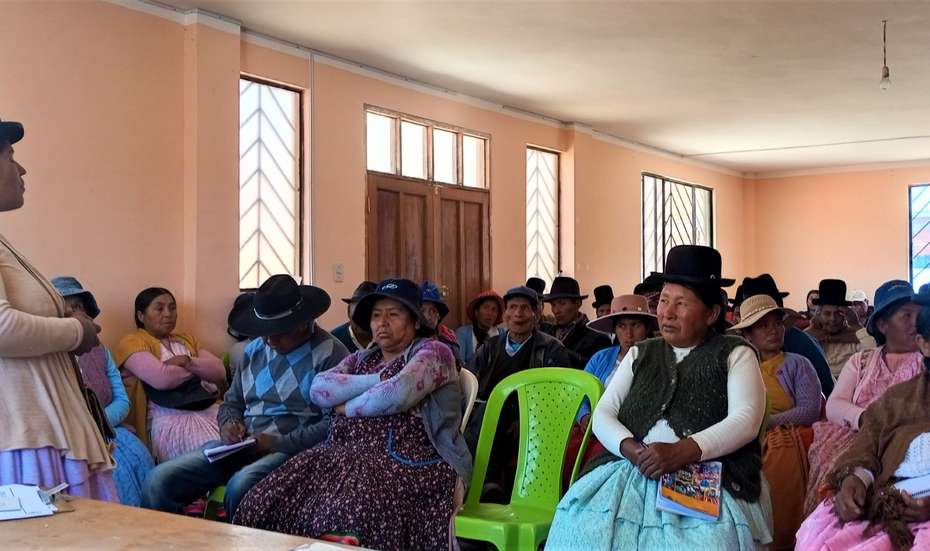
Is enough being done internationally to promote the Right to Food? Is there enough political will to change things?
Unfortunately, I don't think there's enough political will at the highest levels. There's a lot of what you might call social will or societal will at the local level. But the higher up you get, the more other priorities come into play. Even within the United Nations. Last year, I was at a conference on sustainable food systems in Vietnam. I was shocked to see that there were maybe six different UN agencies reflecting on how they had finally reached a consensus on definitions. It's the year 2023 and they´re just reaching a consensus on definitions? I think we're past the age of definitions. By this time the UN should actually have a consolidated approach that's already divided up and being implemented by these agencies.
What would be your appeal to the UN to do more to implement the Right to Food?
Just look at the data! I would say it's reckoning time. Both the number of people who are still going to bed hungry and the number of people that are overweight or obese – this is unacceptable. In a world facing a changing climate this is going to have repercussions that go beyond what we think are the worst-case scenarios. What does this mean in terms of reaching sustainable development goals? What does this mean for people's day-to-day lives? International agencies often get stuck in the big numbers. But we're talking about individual people struggling through life on a day-to-day basis.
On the other hand, if civil society and academia and citizens are not making enough noise, then I guess there's no reason for our elected officials to do anything. We need to voice our concerns, not only focusing on the problem, but also proposing solutions. As soon as you come up with solutions, people who have millions of other things on their agenda are suddenly saying: “I'm open to that. Don't just come and tell me what the problem is because I have a million other problems to think about.” That's one of the ways in which we have changed the conversation in Bolivia. That’s where give and take is really fundamental.
Maria-Teresa Nogales spoke to Hans Brandt and Erwin Northoff
